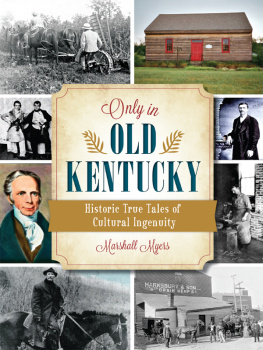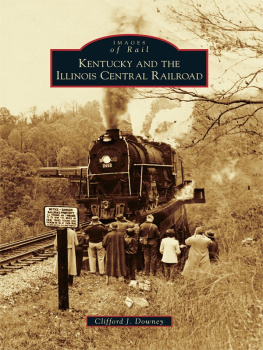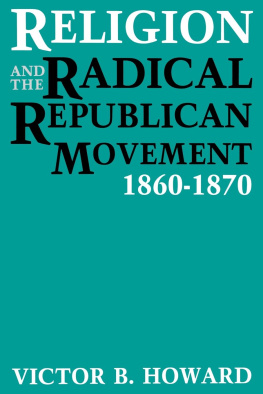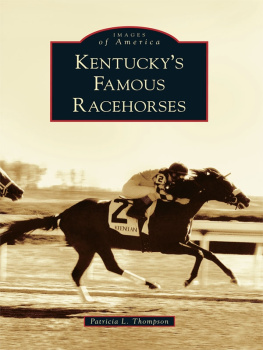

Published by The History Press
Charleston, SC 29403
www.historypress.net
Copyright 2014 by Marshall Myers
All rights reserved
First published 2014
e-book edition 2014
ISBN 978.1.62584.956.4
Library of Congress Cataloging-in-Publication Data
Myers, Marshall.
Only in old Kentucky : historic true tales / Marshall Myers.
pages cm
print edition ISBN 978-1-62619-418-2 (paperback)
1. Kentucky--History--Anecdotes. 2. Kentucky--Social life and customs--Anecdotes. I. Title.
F451.6.M94 2014
976.9--dc23
2014001903
Notice: The information in this book is true and complete to the best of our knowledge. It is offered without guarantee on the part of the author or The History Press. The author and The History Press disclaim all liability in connection with the use of this book.
All rights reserved. No part of this book may be reproduced or transmitted in any form whatsoever without prior written permission from the publisher except in the case of brief quotations embodied in critical articles and reviews.
I dont want to write about anything else than KentuckyI want to be steeped in its history, have its people, their characters, their personalities, their modes of life, and thoughts in my brain. This is my plan.
John Fox Jr.
To my grandsonsJarrod, Matthew, Ryan, Kurt and Collinand great-grandson, Eli.
Contents
Acknowledgements
Any book is not just the product of one person but the effort of many people. This work is no exception. My thanks go to Kirsten Schofield, an editor extraordinaire, for answering my questions and otherwise providing me with expert guidance.
The folks at Information Technology at Eastern Kentucky University, especially Philip Gump, delivered answers to my many inquiries with grace and knowledge.
I also thank Phyllis Bell Conway for taking pictures and being patient as I took pictures.
I want to express my gratitude to all those who helped provide me with images and pictures, including Linda Sizemore.
Thanks go also to Back Home in Kentucky magazine, in which many of these stories were first published and whose editors graciously allowed me to use some of the articles in this work.
Lindsey Carrs work on the cover is to be commended, too.
Norma Bowling also provided me with help in the typing and formatting of the text, and Dr. Gill Hunter served as my expert proofreader.
In the end, the books weaknesses lie with me.
Introduction
Kentuckys culture and history are unique. Few states rival it for its sheer variety of forms and its settlers ability to so rapidly and cleverly adapt to the environmental and social conditions when they passed through Cumberland Gap to behold what many of its residents even today call paradise.
The settlers came from all over, hearing enticing stories about Kentuckys rich soil, unmatched beauty and plentiful game. Most, however, came from the Mother State, Virginia, as well as North Carolina and Pennsylvania. But the Scots-Irish, a hard-living and hardworking bunch, soon put their brand on Kentucky life and culture, occupying what was left from those who gobbled up the good land. From the start, the unique blending of the land-hungry aristocrats and the struggling farmers soon led to an interesting mix of those who established profitable plantations and those who had to make do with what they had and what the land would grudgingly give them. The Low Dutch, a group bent on setting up a Dutch colony to maintain their culture and religion, though largely unsuccessful, added their own view of life to the Kentucky landscape.
The Bluegrass Region, with its gently undulating prairie, seemed suited for raising tobacco and, later, hemp, a major crop until the early twentieth century. There, the models from North Carolina and Virginia held sway and slavery flourished, just as it would in the grasslands of far western Kentucky. For some of these first settlers, life was good. The tight caste system inherited from the early men of money provided the good life for those often nouveau rich, raising copious crops of hemp and tobacco, worked in large part by slaves. For a time, the moneyed class even practiced the gentlemans art of dueling, following elaborate rules in a time-honored European tradition. Soon, the care and breeding of Kentucky horses led to the states still-acknowledged equine superiority.
But for much of the rest of the state, the rich farm was gone, leaving sustenance farmers and struggling merchants, particularly the Scots-Irish, to improvise in order to survive. This included making their own gunpowder from the many caves around the state to boiling the saline water that bubbled up across the state in licks and supplying themselves with salt for sustenance and preserving meat and various vegetables. Realizing the need for iron for tools, nails and other necessary hardware, this hardy bunch mined the iron-ore deposits to smelt their own iron. They soon adopted methods of preserving pork, in particular, to produce flavorful Kentucky country ham, an often-touted variety unduplicated by rivals in the mountain South.
Along the way, the creative citizens gave their names to various cities and towns across the state. Some were named for coal companies that had established the company-owned towns that predominated life in coal country. Others earned colorful monikers like Black Gnat, Monkeys Eyebrow and Possum Trot, their namers carefully avoiding names of Native Americans who had largely used the Commonwealth as a hunting ground but who were deeply despised by the early settlers who wrestled their land from them.
It is often quite surprising when citizens in other stateswhether it be parts of Illinois, Indiana, Missouri, Ohio or various sections of the Deep Southtrace their roots and discover Kentucky ancestors, those early settlers from the Commonwealth who transplanted their values, culture and even their language.
The beloved Kentucky poet Jesse Stuart, a devotee of all things Kentucky, once concluded that if the nation is considered a body, Kentucky is its heart. In the minds of many Kentuckians, that is inordinately true.
Chapter 1
Battletown to Berea to Black Gnat: Where Kentuckians Are From
Kentuckians who live in places like Possum Trot, Tyewhoppety and Monkeys Eyebrow probably have spent considerable time explaining to others where the places they are from got their names. Such names are so unusual that many people are curious about their origins. Rightly so, since they are so different from spots like Lexington, Newport and Pineville, named for cities elsewhere, prominent people or land features.
Yet overall, the names of places in Kentucky richly reflect the history of the state and its people, often mirroring the residents own unique pronunciations. Piloted by Robert Rennicks Kentucky Place Names and Thomas P. Fields A Guide to Kentucky Place Names, with a few exceptions, the Commonwealths ordinary and extraordinary place names fall into certain categories.
WHY SO FEW NATIVE AMERICAN NAMES?
One of the most interesting things about Kentuckys place names is that so few of them come from the Native Americans who lived there thousands of years before any European Americans ever entered the Bluegrass State. While the states name and two of its major waterways, the Ohio and Mississippi Rivers, have Native American origins, only one of its largest cities, Paducah, derives from the language of the first people who lived there. In contrast, nearly half of the names of the fifty states have Native American origins, and hundreds of place names in other states reflect these earlier cultures.
Next page






